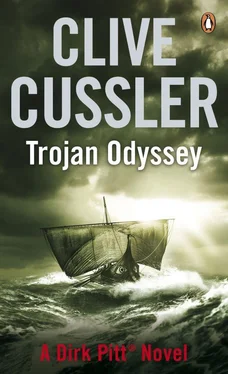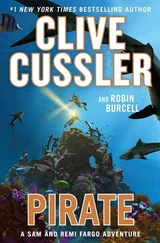Summer studied the horse. "You think our goddess was Epona?"
Boyd shook his head. "No, I don't think so. Epona was worshiped as the goddess of horses, mules and oxen during the Roman era. It's thought that a thousand years earlier she may have been a goddess of beauty and fertility, with the power to throw a spell over men."
"I wish I had her clout," Summer said, laughing.
"What brought down the Druids?" asked Dirk.
"As Christianity gradually took hold and spread throughout Europe, it ridiculed Celtic religion as paganism. Women especially were not accorded the respect they had under the Druids. The heads of the church could not allow any irreverence or opposition to masculine authority. The Romans particularly made a crusade of stamping out the Druid religion. Druidesses were reduced to the category of witches. Women of power were recast as creatures of evil who took up with the devil. Women rulers were especially targeted for exclusion, and were cast from mother goddess to male-oriented domination."
Gunn's academic mind was soaking up every word of Boyd's discourse. "The Romans themselves worshiped pagan gods and goddesses. Why were they driven to erase the Druids?"
"Because the Romans saw the Druids as a source of rebellion against Rome. They were also disgusted by Druid ritual savagery."
"What form of savagery?" asked Sandecker.
"Early Druids conducted human sacrifice. It's claimed that their pagan cult knew no barbaric bounds. Sacrificial blood rites were not uncommon. Another infamous legend concerns 'The Wicker Man.' The Romans recounted events where condemned men and women were placed in huge cane effigies and burned to death."
Summer looked unconvinced. "Were Druidesses known to have participated in these barbaric rituals?"
Boyd made a noncommittal shrug. "It can only be assumed they were as responsible as the Druid priests."
"Which brings us back to the question we've asked ourselves a hundred times," said Dirk. "How did a high-ranking Celtic Druidess come to be entombed on what was once an island in the Caribbean five thousand miles from her homeland in Europe?"
Boyd turned and nodded at Chisholm. "I believe my colleague John Wesley may have some extraordinary answers to your question."
"But first," interrupted Sandecker — he turned to Yaeger—"have you and Max been able to discover how the structure came to be standing under fifty feet of water?"
"Early geological records for the Caribbean are all but nonexistent," replied Yaeger, fanning out a file of loose papers on the table in front of him. "We know more about prehistoric meteor strikes and land movement millions of years ago than we know about geological upheavals three thousand years ago. The best projections from leading geologists whom we've questioned is that Navidad Bank, once an island, sank during an underwater earthquake somewhere between eleven hundred and one thousand b.c."
"How did you arrive at that date?" asked Perlmutter, shifting his huge bulk in a chair too small for him.
"Through various chemical and biological studies, scientists can read how old the encrustations are and how long they took to form on the rock walls, the amount of corrosion and deterioration of the artifacts and the age of the coral surrounding the structure."
Sandecker, reaching in his breast pocket for a cigar and not finding one, began tapping a pen on the table. "The hype-mongers will have a field day claiming Atlantis has been found."
"Not Atlantis." Chisholm shook his head and smiled. "I tossed that one in the air for years. My own opinion is that Plato wrote a fictitious account of the disaster using the eruption of Santorini in sixteen fifty b.c. as background material."
"You don't think Atlantis was in the Caribbean?" said Summer somewhat facetiously. "People claim to have found sunken roads and cities deep under the water."
Chisholm did not look amused. "Geological formations, nothing more. If Atlantis had existed somewhere in the Caribbean, why hasn't one" — he paused for effect—"just one potsherd or artifact of ancient origin been discovered? Sorry, Atlantis did not exist on this side of the ocean."
"According to paleontology records in my library," offered Yaeger, "the Arawak Indians found by the Spanish when they arrived in the New World were the first humans into the West Indies. They had migrated from South America around twenty-five hundred B.C., or fourteen hundred years before the lady was laid to rest in her tomb."
"Somebody always gets there first," said Perlmutter. "Columbus reported seeing the hulks of large European-built ships abandoned on an island beach."
"I can't tell you how she got there," said Chisholm. "But I might shed some light on who she was."
He pressed a button on the remote and the first image on the stone-carved montage found by Dirk and Summer appeared on the monitor. The scene showed what appeared to be a fleet of ships in procession landing on a shoreline. They looked similar to the Viking longboats, but much stubbier, with flat bottoms that enabled them to travel in shallow coastal waters and rivers. Single masts supported square sails that appeared to be made of hides so they wouldn't shred under the onslaught of Atlantic gales. The hulls had high bows and sterns for sailing through rough seas. Banks of oars extended through locks on the top rails of the hulls.
"The first scene from the stone panel shows a fleet of ships unloading fighting men, horses and chariots." He pressed another button on the remote, creating a montage. "Scene Two, the opposing army is seen rising from a huge ditch surrounding a citadel on a steep hill. The next panel has them charging across a flat plain and attacking the enemy before they can unload their ships. Scene Four is the battle to repel the fleet."
"If it wasn't for all the earthen works and the citadel looking as if it was built of wood," said Perlmutter, "I'd say we were looking at the Trojan War."
Chisholm had the look of a wolf watching a herd of sheep approach his den. "You are looking at the Trojan War."
Sandecker fell into the trap. "Strange-looking Greeks and Trojans. I always thought they grew beards, not bushy mustaches."
"That's because they were not Greeks or Trojans."
"Who, then?"
"Celts."
Perlmutter's face wore an expression of genuine satisfaction. "I've also read Iman Wilkens."
Chisholm nodded. "Then you know his remarkable revelations about ancient history's greatest misconception."
"Could you please enlighten the rest of us?" Sandecker asked impatiently.
"I'll be happy to oblige," Chisholm replied. "The battle for Troy…"
"Yes?"
"Did not take place on the west coast of Turkey on the Mediterranean Sea."
Yaeger stared at him, looking puzzled. "If not Turkey, then where?"
"Cambridge, England," Chisholm answered simply, "near the North Sea."
Everyone, with the exception of Perlmutter, gave Chisholm a look of pure disbelief.
"The skepticism in your eyes is obvious," Chisholm challenged. "The world has been misled for a hundred and twenty-six years, when a German merchant named Heinrich Schliemann declared emphatically that he had found Troy by using Homer's Iliad as his guide. He claimed that the ancient mound called Hisarlik was the perfect location for the fortified city of Troy."
"Don't most archaeologists and historians back Schliemann's case?" Gunn queried.
"It's still a hotly debated subject," said Boyd. "Homer was a man of great mystery. There is no proof that he actually existed. All legend tells us is that a man called Homer took epic poems of a great war that had been passed down orally for hundreds of years, and recorded them in a series of adventure tales in what became the world's earliest written literature. Was he one man or a group, who over the centuries refined the poems until the Iliad and the Odyssey became history's greatest classics? The truth will never be known. Besides the enigma of his identity, the great puzzle he left behind is whether the Trojan War was fable or fact. And if it really occurred in the Early Bronze Age, were the Greeks the true enemies of the Trojans, or did Homer write about an event that took place more than a thousand miles away?"
Читать дальше












